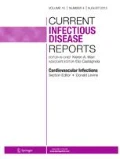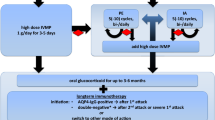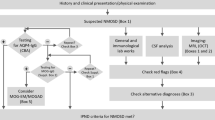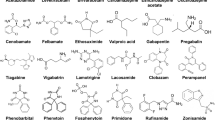Abstract
Despite more than a decade of studying pediatric autoimmune neuropsychiatric disorders associated with streptococcal infection (PANDAS), it is still not possible to confirm its existence and whether it is a poststreptococcal autoimmune disorder. Many controversies remain: the diagnostic criteria have not been validated, evidence of autoimmunity remains inconclusive, evidence of a genetic predisposition is weak, and streptococcal infections are common in childhood and could represent only a trigger of exacerbations of tics and obsessive-compulsive disorder. Patients who fit the PANDAS criteria appear to represent a subgroup of children with chronic tic disorder and/or obsessive-compulsive disorder who may experience symptom exacerbations after group A β-hemolytic streptococci infections; however, those infections are not the sole or even the most common antecedent of exacerbations. There is not enough evidence to support PANDAS as a unique clinical entity.
Similar content being viewed by others
References
Papers of particular interest, published recently, have been highlighted as: • Of importance •• Of major importance
Swedo SE, Leonard HL, Garvey M, et al.: Pediatric autoimmune neuropsychiatric disorders associated with streptococcal infections: clinical description of the first 50 cases. Am J Psychiatry 1998, 155:264–271.
Guidelines for the diagnosis of rheumatic fever. Jones Criteria, 1992 update. Special Writing Group of the Committee on Rheumatic Fever, Endocarditis, and Kawasaki Disease of the Council on Cardiovascular Disease in the Young of the American Heart Association [erratum in JAMA 1993, 269:476]. JAMA 1992, 268:2069–2073.
Swedo SE, Rapoport JL, Cheslow DL, et al.: High prevalence of obsessive-compulsive symptoms in patients with Sydenham’s chorea. Am J Psychiatry 1989, 146:246–249.
Cardona F, Orefici G: Group A streptococcal infections and tic disorders in an Italian pediatric population. J Pediatr 2001, 138:71–75.
Bodner SM, Morshed SA, Peterson BS: The question of PANDAS in adults. Biol Psychiatry 2001, 49:807–810.
Singer HS, Walkup JT: Tourette syndrome and other tic disorders. Diagnosis, pathophysiology, and treatment. Medicine (Baltimore) 1991, 70:15–32.
Kurlan R: The PANDAS hypothesis: losing its bite? Mov Disord 2004, 19:371–374.
Kurlan R, Kaplan EL: The pediatric autoimmune neuropsychiatric disorders associated with streptococcal infection (PANDAS). Etiology for Tics and obsessive-compulsive symptoms: hypothesis or entity? Practical consideration for clinician. Pediatrics 2004, 113:883–886.
Moretti G, Pasquini M, Mandarelli G, et al.: What every psychiatrist should know about PANDAS: a review. Clin Pract Epidemol Ment Health 2008, 21:4–13.
Berrios X, Quesney F, Morales A, et al.: Are all recurrences of “pure” Sydenham chorea true recurrences of acute rheumatic fever? Pediatrics 1985, 10:867–872.
•• Murphy TK, Snider LA, Mutch PJ, et al.: Relationship of movements and behaviors to group A Streptococcus infections in elementary school children. Biol Psychiatry 2007, 61:279–284. This article describes a community-based longitudinal study that enrolled 693 children and determined prevalence of group A streptococcal infections, tic behaviors, and choreiform movements.
•• Kurlan R, Johnson D, Kaplan EL, et al.: Streptococcal infection and exacerbations of childhood tics and obsessive-compulsive symptoms: a prospective blinded cohort study. Pediatrics 2008, 121:1188–1197. This study showed that children meeting criteria for PANDAS have more clinical exacerbations, more streptococcal infections, and more links between infection and exacerbations than matched controls. However, the results do not support PANDAS as being a unique clinical entity.
Cunningham MW: Pathogenesis of group A streptococcal infections. Clin Microbiol Rev 2000, 13:470–511.
Singer HS, Hong JJ, Yoon DY, et al.: Serum autoantibodies do not differentiate PANDAS and Tourette syndrome from controls. Neurology 2005, 65:1701–1707.
Rizzo R, Gulisano M, Pavone P, et al.: Increased antistreptococcal antibody titers and anti-basal ganglia antibodies in patients with Tourette syndrome: controlled cross-sectional study. J Child Neurol 2006, 21:747–753.
Church AJ, Dale RC, Giovannoni G: Anti-basal ganglia antibodies: a possible diagnostic utility in idiopathic movement disorders? Arch Dis Child 2004, 89:611–614.
Loiselle CR, Wendlandt JT, Rohde CA, et al.: Antistreptococcal, neuronal, and nuclear antibodies in Tourette syndrome. Pediatr Neurol 2003, 28:119–125.
• Morris CM, Pardo-Villamizar C, Gause CD, et al.: Serum autoantibodies measured by immunofluorescence confirm a failure to differentiate PANDAS and Tourette syndrome from controls. J Neurol Sci 2009, 276:45–48. In this study, immunohistochemical techniques were used to identify serum antistriatal antibody reactivity. No significant differences in immunofluorescence or localization were identified in patients with PANDAS and TS as compared with controls.
Singer HS, Loiselle CR, Lee O, et al.: Anti-basal ganglia antibodies in PANDAS. Mov Disord 2004, 19:406–415.
Morer A, Lázaro L, Sabater L, et al.: Antineuronal antibodies in a group of children with obsessive-compulsive disorder and Tourette syndrome. J Psychiatr Res 2008, 42:64–68.
Hallett J, Harling-Berg C, Knopf P, et al.: Anti-striatal antibodies in Tourette syndrome cause neuronal dysfunction. J Neuroimmunol 2000, 111:195–202.
Taylor J, Morshed S, Parveen S, et al.: An animal model of Tourette’s syndrome. Am J Psychiatry 2002, 159:657–660.
Loiselle C, Lee O, Moran T, et al.: Striatal microinfusion of Tourette syndrome and PANDAS sera: failure to induce behavioral changes. Mov Disord 2004, 19:390–396.
Kondo K, Kabasawa T: Improvement in Gilles de la Tourette syndrome after corticosteroid therapy. Ann Neurol 1978, 4:387.
Matarazzo EB: Tourette’s syndrome treated with ACTH and prednisone: report of two cases. J Child Adolesc Psychopharm 1992, 2:215–226.
Perlmutter S, Leitman S, Garvey M, et al.: Therapeutic plasma exchange and intravenous immunoglobulins for obsessive-compulsive disorder and tic disorders in childhood. Lancet 1999, 354:1153–1158.
Beşiroğlu L, Ağargün MY, Ozbebit O, et al.: Therapeutic response to plasmapheresis in four cases with obsessive-compulsive disorder and tic disorder triggered by streptococcal infections. Turk Psikiyatri Derg 2007, 18:270–276.
Murphy ML, Pichichero ME: Prospective identification and treatment of children with pediatric autoimmune neuropsychiatric disorder associated with group A streptococcal infection (PANDAS). Arch Pediatr Adolesc Med 2002, 156:356–361.
Pichichero ME: The PANDAS syndrome. Adv Exp Med Biol 2009, 634:205–216.
Perrin EM, Murphy ML, Casey JR, et al.: Does group A beta-hemolytic streptococcal infection increase risk for behavioral and neuropsychiatric symptoms in children? Arch Pediatr Adolesc Med 2004, 158:848–856.
Mell LK, Davis RL, Owens D: Association between streptococcal infection and obsessive-compulsive disorder, Tourette’s syndrome, and tic disorder. Pediatrics 2005, 116:56–60.
• Schrag A, Gilbert R, Giovannoni G, et al.: Streptococcal infection, Tourette syndrome, and OCD: is there a connection? Neurology 2009, 73:1256–1263. This case-control study does not support a strong relationship between streptococcal infections and neuropsychiatric syndromes such as OCD and TS.
• Gabbay V, Coffey BJ, Babb JS, et al.: Pediatric autoimmune neuropsychiatric disorders associated with streptococcus: comparison of diagnosis and treatment in the community and at a specialty clinic. Pediatrics 2008, 122:273–278. This article describes a cross-sectional study of 176 children evaluated for tics and TS. PANDAS is frequently diagnosed in the community without the application of all diagnostic criteria, resulting in unwarranted use of antibiotic treatment for tics/OCD without evidence of laboratory infection.
Gilbert DL, Kurlan R: PANDAS: horse or zebra? Neurology 2009, 73:1252–1253.
Allen AJ, Leonard HL, Swedo SE: Case study: a new infection-triggered, autoimmune subtype of pediatric OCD and Tourette’s syndrome. J Am Acad Child Adolesc Psychiatry 1995, 34:307–311.
Müller N, Riedel M, Blendinger C, et al.: Mycoplasma pneumoniae infection and Tourette’s syndrome. Psychiatry Res 2004, 129:119–125.
Lougee L, Perlmutter SJ, Nicolson R, et al.: Psychiatric disorders in first-degree relatives of children with pediatric autoimmune neuropsychiatric disorders associated with streptococcal infections (PANDAS). J Am Acad Child Adolesc Psychiatry 2000, 39:1120–1126.
Dranitzki Z, Steiner I: PANDAS in siblings: a common risk? Eur J Neurol 2007, 14:e4.
de Oliveira SK: PANDAS: a new disease? J Pediatr (Rio J) 2007, 83:201–208.
Swedo SE, Leonard HL, Mittleman BB, et al.: Identification of children with pediatric autoimmune neuropsychiatric disorders associated with streptococcal infections by a marker associated with rheumatic fever. Am J Psychiatry 1997, 154:110–112.
Murphy TK, Goodman WK, Fudge MW, et al.: B lymphocyte antigen D8/17: a peripheral marker for childhood-onset obsessive-compulsive disorder and Tourette’s syndrome? Am J Psychiatry 1997, 154:402–407.
Hamilton CS, Garvey MA, Swedo SE: Sensitivity of the D8/17 assay. Am J Psychiatry 2003, 160:1193–1194; author reply 1194.
Garvey MA, Perlmutter SJ, Allen AJ, et al.: A pilot study of penicillin prophylaxis for neuropsychiatric exacerbations triggered by streptococcal infections. Biol Psychiatry 1999, 45:1564–1571.
Snider LA, Lougee L, Slattery M, et al.: Antibiotic prophylaxis with azithromycin or penicillin for childhood-onset neuropsychiatric disorders. Biol Psychiatry 2005, 57:788–792.
Orvidas LJ, Slattery MJ: Pediatric autoimmune neuropsychiatric disorders and streptococcal infections: role of otolaryngologist. Laryngoscope 2001, 111:1515–1519.
Heubi C, Shott SR: PANDAS: pediatric autoimmune neuropsychiatric disorders associated with streptococcal infections-an uncommon, but important indication for tonsillectomy. Int J Pediatr Otorhinolaryngol 2003, 67:837–840.
Batuecas Caletrío A, Sánchez González F, Santa Cruz Ruiz S, et al.: PANDAS Syndrome: a new tonsillectomy indication? Acta Otorrinolaringol Esp 2008, 59:362–363.
Disclosure
No potential conflict of interest relevant to this article was reported.
Author information
Authors and Affiliations
Corresponding author
Rights and permissions
About this article
Cite this article
de Oliveira, S.K.F., Pelajo, C.F. Pediatric Autoimmune Neuropsychiatric Disorders Associated with Streptococcal Infection (PANDAS): a Controversial Diagnosis. Curr Infect Dis Rep 12, 103–109 (2010). https://doi.org/10.1007/s11908-010-0082-7
Published:
Issue Date:
DOI: https://doi.org/10.1007/s11908-010-0082-7




